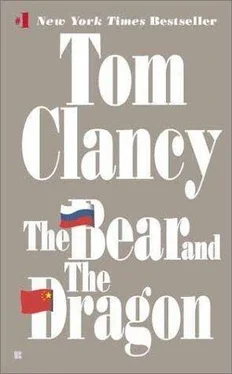Tom Clancy - The Bear and the Dragon
Здесь есть возможность читать онлайн «Tom Clancy - The Bear and the Dragon» весь текст электронной книги совершенно бесплатно (целиком полную версию без сокращений). В некоторых случаях можно слушать аудио, скачать через торрент в формате fb2 и присутствует краткое содержание. Год выпуска: 2001, ISBN: 2001, Жанр: Триллер, на английском языке. Описание произведения, (предисловие) а так же отзывы посетителей доступны на портале библиотеки ЛибКат.
- Название:The Bear and the Dragon
- Автор:
- Жанр:
- Год:2001
- ISBN:780425180969
- Рейтинг книги:3 / 5. Голосов: 1
-
Избранное:Добавить в избранное
- Отзывы:
-
Ваша оценка:
- 60
- 1
- 2
- 3
- 4
- 5
The Bear and the Dragon: краткое содержание, описание и аннотация
Предлагаем к чтению аннотацию, описание, краткое содержание или предисловие (зависит от того, что написал сам автор книги «The Bear and the Dragon»). Если вы не нашли необходимую информацию о книге — напишите в комментариях, мы постараемся отыскать её.
The Bear and the Dragon — читать онлайн бесплатно полную книгу (весь текст) целиком
Ниже представлен текст книги, разбитый по страницам. Система сохранения места последней прочитанной страницы, позволяет с удобством читать онлайн бесплатно книгу «The Bear and the Dragon», без необходимости каждый раз заново искать на чём Вы остановились. Поставьте закладку, и сможете в любой момент перейти на страницу, на которой закончили чтение.
Интервал:
Закладка:
And everyone nodded nervous agreement on that one. They did control the media. The American CNN news service had been turned off all over the People’s Republic, along with all Western news services, even in Hong Kong, which usually enjoyed much looser reins than the rest of the country. But the thing no one addressed, but everyone knew to worry about, was that every soldier had a mother and a father who’d notice when the mail home stopped coming. Even in a nation as tightly controlled as the PRC, you couldn’t stop the Truth from getting out-or rumors, which, though false, could be even worse than an adverse Truth. People would believe things other than those they were told to believe, if those other things made more sense than the Official Truth proclaimed by their government in Beijing.
Truth was something so often feared in this room, Fang realized, and for the first time in his life he wondered why that had to be. If the Truth was something to fear, might that mean they were doing something wrong in here? But, no, that couldn’t be true, could it? Didn’t they have a perfect political model for reality? Wasn’t that Mao’s bequest to their country?
But if that were true, why did they fear having the people find out what was really happening?
Could it be that they, the Politburo members, could handle the Truth and the peasantry could not?
But then, if they feared having the peasantry get hold of the Truth, didn’t that have to mean that the Truth was harmful to the people sitting in this room? And if the Truth was a danger to the peasants and workers, then didn’t they have to be wrong?
Fang suddenly realized how dangerous was the thought that had just entered his mind.
“Luo, what does it mean to us strategically,” the Interior Minister asked, “if the Americans remove half of our strategic weapons? Was that done deliberately? If so, for what cause?”
“Tong, you do not sink a ship by accident, and so, yes, the attack on our missile submarine must have been a deliberate act,” Luo answered.
“So, the Americans deliberately removed from the table one of our only methods for attacking them directly? Why? Was that not a political act, not just a military one?”
The Defense Minister nodded. “Yes, you could see it that way.”
“Can we expect the Americans to strike at us directly? To this date they have struck some bridges, but what about our government and vital industries? Might they strike directly at us?” Tong went on.
“That would be unwise. We have missiles targeted at their principal cities. They know this. Since they disarmed themselves of nuclear missiles some years ago-well, they still have nuclear bombs that can be delivered by bombers and tactical aircraft, of course, but not the ability to strike at us in the way that we could strike at them-and the Russians, of course.”
“How sure are we that they are disarmed?” Tong persisted.
“If they have ballistic arms, they’ve concealed it from everyone,” Tan Deshi told them all. Then he shook his head decisively. “No, they have no more.”
“And that gives us an advantage, doesn’t it?” Zhong asked, with a ghoulish smile.
USS Gettysburg was alongside the floating pier in the York River. Once the warheads for Trident missiles had been stored here, and there must still have been some awaiting dismantlement, because there were Marines to be seen, and only Marines were entrusted to guard the Navy’s nuclear weapons. But none of those were on the pier. No, the trucks that rolled out from the weapons depot were carrying long, square cross-sectioned boxes that contained SM-2 ER Block-IVD surface-to-air missiles. When the trucks got to the cruiser, a traveling crane lifted them up to the foredeck of the ship, where, with the assistance of some strong-backed sailors, the boxes were rapidly lowered into the vertical launch cells of the forward missile launcher. It took about four minutes per box, Gregory saw, with the captain pacing his wheelhouse all the while. Gregory knew why. He had an order to take his cruiser right to Washington, D.C., and the order had the word “expedite” on it. Evidently, “expedite” was a word with special meaning for the United States Navy, like having your wife call for you from the baby’s room at two in the morning. The tenth box was duly lowered, and the crane swung clear of the ship.
“Mr. Richardson,” Captain Blandy said to the Officer of the Deck.
“Yes, sir,” the lieutenant answered.
“Let’s get under way.”
Gregory walked out on the bridge wing to watch. The Special Sea Detail cast off the six-inch hawsers, and scarcely had they fallen clear of the cleats on the main deck when the cruiser’s auxiliary power unit started pushing the ten thousand tons of gray steel away from the floating pier. And the ship was for sure in a hurry. She was not fifteen feet away when the main engines started turning, and less than a minute after that, Gregory heard the WHOOSH of the four jet-turbines taking a big gulp of air, and he could feel the ship accelerate for the Chesapeake Bay, almost like being on a city transit bus.
“Dr. Gregory?” Captain Blandy had stuck his head out the pilothouse door.
“Yeah, Captain?”
“You want to get below and do your software magic on our birds?”
“You bet.” He knew the way, and in three minutes was at the computer terminal which handled that task.
“Hey, Doc,” Senior Chief Leek said, sitting down next to him. “All ready? I’m supposed to help.”
“Okay, you can watch, I suppose.” The only problem was that it was a clunky system, about as user-friendly as a chain saw, but as Leek had told him a week before, this was the flower of 1975 technology, back when an Apple-II with 64K of RAM was the cat’s own ass. Now he had more computing power in his wristwatch. Each missile had to be upgraded separately, and each was a seven-step process.
“Hey, wait a minute,” Gregory objected. The screen wasn’t right.
“Doc, we loaded six Block-IVD. The other two are stock SM-2 ER Block IIIC radar-homers. What can I tell you, Cap’n Blandy’s conservative.”
“So I only do the upgrade on holes one through six?”
“No, do ’em all. It’ll just ignore the changes you made to the infrared homing code. The chips on the birds can handle the extra code, no sweat, right, Mr. Olson?”
“Correct, Senior Chief,” Lieutenant Olson confirmed. “The missiles are current technology even if the computer system isn’t. It probably costs more to make missile seeker-heads with current technology that can talk to this old kludge than it would to buy a new Gateway to upgrade the whole system, not to mention having a more reliable system overall, but you’ll have to talk to NAVSEA about that.”
“Who?” Gregory asked.
“Naval Sea Systems Command. They’re the technical geniuses who won’t put stabilizers on these cruisers. They think it’s good for us to puke in a seaway.”
“Feathermerchants,” Leek explained. “Navy’s full of ’em-on land, anyway.” The ship heeled strongly to starboard.
“Cap’n’s in a hurry, ain’t he?” Gregory observed. Gettysburg was making a full-speed right-angle turn to port.
“Well, SACLANT said it’s the SecDef’s idea. I guess that makes it important,” Mr. Olson told their guest.
Ithink this is imprudent,” Fang told them all.
“Why is that?” Luo asked.
“Is fueling the missiles necessary? Is there not a danger of provocation?”
“I suppose this is a technical matter,” Qian said. “As I recall, once you fuel them, you cannot keep them fueled for more than-what? Twelve hours?”
The technocrat caught the Defense Minister off guard with that question. He didn’t know the answer. “I will have to consult with Second Artillery for that,” he admitted.
Читать дальшеИнтервал:
Закладка:
Похожие книги на «The Bear and the Dragon»
Представляем Вашему вниманию похожие книги на «The Bear and the Dragon» списком для выбора. Мы отобрали схожую по названию и смыслу литературу в надежде предоставить читателям больше вариантов отыскать новые, интересные, ещё непрочитанные произведения.
Обсуждение, отзывы о книге «The Bear and the Dragon» и просто собственные мнения читателей. Оставьте ваши комментарии, напишите, что Вы думаете о произведении, его смысле или главных героях. Укажите что конкретно понравилось, а что нет, и почему Вы так считаете.






![Александр Ирвин - Tom Clancy’s The Division 2. Фальшивый рассвет [litres]](/books/417744/aleksandr-irvin-tom-clancy-s-the-division-2-falsh-thumb.webp)




